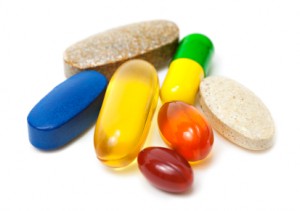 A big part of being a dad is making sure your kids are healthy. Nutrition is important, and many kids today eat foods that are fast and simple, but are poor in vitamins. A growing child’s body needs vitamins to work properly, and for proper growth and development. There are two types of vitamins: fat-soluble, such as vitamins A, D, E and K, and water-soluble vitamins such as C and the B vitamins. Fat-soluble vitamins can be stored in the body for long periods of time until needed, while excess water-soluble vitamins are passed out of the body, and need to be taken regularly. The best source for these vitamins is natural, whole foods, with vitamin supplements being a second best choice for your child’s nutrition.
A big part of being a dad is making sure your kids are healthy. Nutrition is important, and many kids today eat foods that are fast and simple, but are poor in vitamins. A growing child’s body needs vitamins to work properly, and for proper growth and development. There are two types of vitamins: fat-soluble, such as vitamins A, D, E and K, and water-soluble vitamins such as C and the B vitamins. Fat-soluble vitamins can be stored in the body for long periods of time until needed, while excess water-soluble vitamins are passed out of the body, and need to be taken regularly. The best source for these vitamins is natural, whole foods, with vitamin supplements being a second best choice for your child’s nutrition.
Vitamin A
An important antioxidant, Vitamin A is great for your kids’ eyes, skin, and promotes proper growth. The best source of this vitamin is orange colored fruits and veggies or dark green leafy stuff. Carrots, cantaloupe, squash, sweet potatoes, spinach and kale are all good sources of Vitamin A.
B Vitamins
The B vitamins are necessary for a healthy metabolism, and assist the body in converting food into energy and the production of red blood cells. The plethora of B vitamins (B1, B2, B6, B12, biotin, folic acid, niacin, and pantothenic acid) can all be obtained from foods rich in protein, such as beans, green leafy vegetables (read “rabbit foodâ€), whole grains, dairy products, eggs, poultry, seafood, and of course, meat (read “steak, mmmmmâ€). These vitamins are all water-soluble, so they need to be consumed on a regular basis.
Vitamin C
This antioxidant is important for healthy tissues, and helps boost the immune system. Citrus fruits, kiwi fruit, tomatoes, sweet red peppers, strawberries, cabbage and/or brocoli should be consumed on a daily basis to replenish the water-soluble viatmin.
Vitamin D
Important for strong teeth and bones, vitamin D helps the body absorb calcium, among many other important processes in the body. For a young child, whose bones are still growing, vitamin D is possibly the most important vitamin for children. Vitamin D can be found in fortified milk, liver, fish, and egg yolks. The body produces vitamin D when exposed to sunlight, so make sure the kids get some outdoor time as well.
Vitamin E
Another antioxidant, vitamin E helps to maintain body tissues like the skin, eyes and liver, while also protecting the lungs from pollution. This vitamin is also used in the formation of red blood cells. This vitamin is fat soluble, so care should be taken with the amount taken. Natural sources for this vitamin include sardines, green leafy veggies, nuts, seeds, whole grains, egg yolks, and wheat germ.
Vitamin K
Newborn babies often come into the world deficient in vitamin K, which helps with blood clotting; normally babies are given an injection fo this important vitamin right after birth. After that, kids can get this important vitamin from broccoli, dairy products, green leafy vegetables, and soybean oil.
